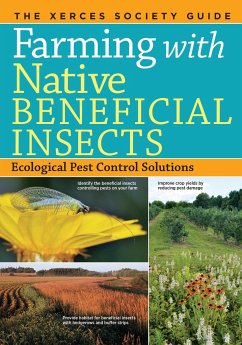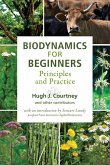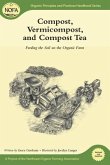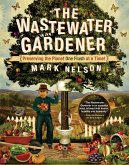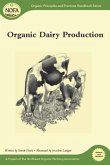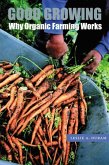23,99 €
inkl. MwSt.
Versandfertig in über 4 Wochen

12 °P sammeln
- Broschiertes Buch
- Merkliste
- Auf die Merkliste
- Bewerten Bewerten
- Teilen
- Produkt teilen
- Produkterinnerung
- Produkterinnerung
Eliminate Pesticides, Restore Biodiversity GROW BOUNTIFUL ORGANIC CROPS while improving the biodiversity of your farm by making your land a welcoming place for native beneficial insects. Mantids, stink bugs, beetles, flies, wasps, and many others prey upon crop pests, reducing or eliminating the need for chemical pesticides. Your first step is learning to identify these important farm heroes: close-up photography and in-depth profiles familiarize you with more than 20 beneficial insects and their kin. After assessing your land, current practices, and goals, you'll find detailed…mehr
Andere Kunden interessierten sich auch für
![Biodynamics for Beginners Biodynamics for Beginners]() Hugh J. CourtneyBiodynamics for Beginners27,99 €
Hugh J. CourtneyBiodynamics for Beginners27,99 €![Compost, Vermicompost and Compost Tea Compost, Vermicompost and Compost Tea]() Grace GershunyCompost, Vermicompost and Compost Tea15,99 €
Grace GershunyCompost, Vermicompost and Compost Tea15,99 €![Agriculture Agriculture]() Rudolf SteinerAgriculture22,99 €
Rudolf SteinerAgriculture22,99 €![The Wastewater Gardener The Wastewater Gardener]() Mark NelsonThe Wastewater Gardener22,99 €
Mark NelsonThe Wastewater Gardener22,99 €![Insects of Stored Grain Insects of Stored Grain]() David ReesInsects of Stored Grain29,99 €
David ReesInsects of Stored Grain29,99 €![Organic Dairy Production Organic Dairy Production]() Sarah FlackOrganic Dairy Production13,99 €
Sarah FlackOrganic Dairy Production13,99 €![Good Growing Good Growing]() Leslie A DuramGood Growing21,99 €
Leslie A DuramGood Growing21,99 €-
-
-
Eliminate Pesticides, Restore Biodiversity GROW BOUNTIFUL ORGANIC CROPS while improving the biodiversity of your farm by making your land a welcoming place for native beneficial insects. Mantids, stink bugs, beetles, flies, wasps, and many others prey upon crop pests, reducing or eliminating the need for chemical pesticides. Your first step is learning to identify these important farm heroes: close-up photography and in-depth profiles familiarize you with more than 20 beneficial insects and their kin. After assessing your land, current practices, and goals, you'll find detailed instructions for a host of projects, from beetle banks to organic buffers, to improve habitat for your insect helpers. PLANTING PROJECTS FOR PROVIDING HEALTHY HABITATS INCLUDE: * Hedgerows * Insectary strips * Native plant field borders * Cover crops * Contour buffer strips * Grassed waterways
Hinweis: Dieser Artikel kann nur an eine deutsche Lieferadresse ausgeliefert werden.
Hinweis: Dieser Artikel kann nur an eine deutsche Lieferadresse ausgeliefert werden.
Produktdetails
- Produktdetails
- Verlag: Storey Publishing
- Seitenzahl: 272
- Erscheinungstermin: 29. Juli 2014
- Englisch
- Abmessung: 254mm x 180mm x 20mm
- Gewicht: 729g
- ISBN-13: 9781612122830
- ISBN-10: 1612122833
- Artikelnr.: 39186175
- Herstellerkennzeichnung
- Libri GmbH
- Europaallee 1
- 36244 Bad Hersfeld
- gpsr@libri.de
- Verlag: Storey Publishing
- Seitenzahl: 272
- Erscheinungstermin: 29. Juli 2014
- Englisch
- Abmessung: 254mm x 180mm x 20mm
- Gewicht: 729g
- ISBN-13: 9781612122830
- ISBN-10: 1612122833
- Artikelnr.: 39186175
- Herstellerkennzeichnung
- Libri GmbH
- Europaallee 1
- 36244 Bad Hersfeld
- gpsr@libri.de
The Xerces Society is a nonprofit organization based in Portland, Oregon, that protects wildlife through the conservation of invertebrates and their habitat. Established in 1971, the Society is at the forefront of invertebrate protection worldwide, harnessing the knowledge of scientists and the enthusiasm of citizens to implement conservation programs. They are the authors of 100 Plants to Feed the Bees, Farming with Native Beneficial Insects, and Attracting Native Pollinators.
Preface
Part 1: Beneficial Insect Ecology
1. Pest Control with Beneficial Insects
What are Beneficial Insects? ~ Pest Control and Farming ~ Enhancing
Beneficial Insect Populations ~ Approaches to Biocontrol ~ Common
Predators and Parasitoids: Their Habitat and Prey
2. Why Farm with Native Beneficial Insects?
Pest Control ~ Benefits beyond Pest Control ~ Case Study: Pest
Management in Washington State Vineyards ~ Case Study:
Milkweed, Stink Bugs, and Georgia Cotton
3. Evaluating Beneficial Insect Habitat
Habitat Essentials ~ Farm Practices Checklist ~ Case Study:
Beneficial Insects Save Christmas
Part 2: Improving Beneficial Insect Habitat
4. Designing New Beneficial Insect Habitat
What Beneficial Insects Need ~ Habitat Size and Location ~
Wildflower Selection
5. Native Plant Field Borders
Establishing Borders from Seed ~ Site Preparation ~ Seeding ~ Long-Term
Maintenance ~ Sample Seed Mixes for Native Plant Field Borders
6. Insectary Strips
Perennials or Annuals? ~ Plant Insectary Strips ~ Case Study:
An Insectary Seed Mix for New Mexico Pumpkins ~ Sample
Insectary Seed Mixes
7. Hedgerows
Installing a New Hedgerow ~ Revitalizing Old Fencerows ~Sample
Hedgerow Plant Mixes ~ Case Study: Hedgerows on California Central Valley
Farms
8. Cover Crops
Species Selection ~ Establishing a Cover Crop ~ Case Study:
A Better Farm for Beneficials
9. Conservation Buffers
Contour Buffer Strips ~ Grassed Waterways ~ Riparian Buffers
and Filter Strips ~ Shelterbelts and Windbreaks ~ Organic Farm Buffers ~
Case Study: Buffer Strips for Soybean Aphid Control
10. Beetle Banks and Other Shelters
Beetle Banks ~ Tunnel Nests ~ Wasp Shelters ~ Brush Piles ~
Insect Hotels ~ Case Study: Banking on Beetles in Oregon
Part 3: Managing Beneficial Insect Habitat
11. Reducing Pesticide Impacts
If You Must Use Pesticides ~ Pesticide Selection ~ Microbial Insecticides
and Nematodes ~ Alternatives to Pesticides ~ Controlling Spray Drift ~
Case Study: Designing Windbreaks to Limit Pesticide Drift ~ Case Study:
Biological Mite Control in Pennsylvania Apple Orchards
12. Long-Term Habitat Management
Disking, Mowing, and Burning ~ Grazing ~ Rotating Habitat
Disturbance ~ Interseeding Wildflowers ~ Case Study: Beneficial
Insect Habitat on an Oklahoma Farm and Ranch
Part 4: Common Beneficial Insects and Their Kin
PREDATORY INSECTS
Assassin Bugs, Ambush Bugs
Big-Eyed Bugs
Damsel Bugs
Minute Pirate Bugs, Insidious Flower Bugs
Predatory Stink Bugs
Mantids
Green Lacewings, Brown Lacewings
Checkered Beetles
Firefly Beetles, Fireflies, Lightning Bugs
Ground Beetles
Tiger Beetles
Lady Beetles, Lady Bugs, Ladybird Beetles
Soft-Winged Flower Beetles
Soldier Beetles
Rove Beetles
Flower Flies, Hover Flies
Predatory Wasps
PARASITOIDS
Parasitoid Wasps
Scarab-Hunting Wasps
Tachinid Flies
NONINSECT BENEFICIAL PREDATORS
Jumping Spiders, Wolf Spider, Orb Weaver Spiders,
Sheet-Weaving Spiders
Harvestmen
Predatory Mites
Part 5: Plants for Conservation Biocontrol
Native Wildflowers
Native Flowering Trees and Shrubs
Native Grasses
Cover Crops and Nonnative Insectary Plants
Part 6: Appendix
Additional Resources
About the Authors
The Xerces Society for Invertebrate Conservation
Index
Part 1: Beneficial Insect Ecology
1. Pest Control with Beneficial Insects
What are Beneficial Insects? ~ Pest Control and Farming ~ Enhancing
Beneficial Insect Populations ~ Approaches to Biocontrol ~ Common
Predators and Parasitoids: Their Habitat and Prey
2. Why Farm with Native Beneficial Insects?
Pest Control ~ Benefits beyond Pest Control ~ Case Study: Pest
Management in Washington State Vineyards ~ Case Study:
Milkweed, Stink Bugs, and Georgia Cotton
3. Evaluating Beneficial Insect Habitat
Habitat Essentials ~ Farm Practices Checklist ~ Case Study:
Beneficial Insects Save Christmas
Part 2: Improving Beneficial Insect Habitat
4. Designing New Beneficial Insect Habitat
What Beneficial Insects Need ~ Habitat Size and Location ~
Wildflower Selection
5. Native Plant Field Borders
Establishing Borders from Seed ~ Site Preparation ~ Seeding ~ Long-Term
Maintenance ~ Sample Seed Mixes for Native Plant Field Borders
6. Insectary Strips
Perennials or Annuals? ~ Plant Insectary Strips ~ Case Study:
An Insectary Seed Mix for New Mexico Pumpkins ~ Sample
Insectary Seed Mixes
7. Hedgerows
Installing a New Hedgerow ~ Revitalizing Old Fencerows ~Sample
Hedgerow Plant Mixes ~ Case Study: Hedgerows on California Central Valley
Farms
8. Cover Crops
Species Selection ~ Establishing a Cover Crop ~ Case Study:
A Better Farm for Beneficials
9. Conservation Buffers
Contour Buffer Strips ~ Grassed Waterways ~ Riparian Buffers
and Filter Strips ~ Shelterbelts and Windbreaks ~ Organic Farm Buffers ~
Case Study: Buffer Strips for Soybean Aphid Control
10. Beetle Banks and Other Shelters
Beetle Banks ~ Tunnel Nests ~ Wasp Shelters ~ Brush Piles ~
Insect Hotels ~ Case Study: Banking on Beetles in Oregon
Part 3: Managing Beneficial Insect Habitat
11. Reducing Pesticide Impacts
If You Must Use Pesticides ~ Pesticide Selection ~ Microbial Insecticides
and Nematodes ~ Alternatives to Pesticides ~ Controlling Spray Drift ~
Case Study: Designing Windbreaks to Limit Pesticide Drift ~ Case Study:
Biological Mite Control in Pennsylvania Apple Orchards
12. Long-Term Habitat Management
Disking, Mowing, and Burning ~ Grazing ~ Rotating Habitat
Disturbance ~ Interseeding Wildflowers ~ Case Study: Beneficial
Insect Habitat on an Oklahoma Farm and Ranch
Part 4: Common Beneficial Insects and Their Kin
PREDATORY INSECTS
Assassin Bugs, Ambush Bugs
Big-Eyed Bugs
Damsel Bugs
Minute Pirate Bugs, Insidious Flower Bugs
Predatory Stink Bugs
Mantids
Green Lacewings, Brown Lacewings
Checkered Beetles
Firefly Beetles, Fireflies, Lightning Bugs
Ground Beetles
Tiger Beetles
Lady Beetles, Lady Bugs, Ladybird Beetles
Soft-Winged Flower Beetles
Soldier Beetles
Rove Beetles
Flower Flies, Hover Flies
Predatory Wasps
PARASITOIDS
Parasitoid Wasps
Scarab-Hunting Wasps
Tachinid Flies
NONINSECT BENEFICIAL PREDATORS
Jumping Spiders, Wolf Spider, Orb Weaver Spiders,
Sheet-Weaving Spiders
Harvestmen
Predatory Mites
Part 5: Plants for Conservation Biocontrol
Native Wildflowers
Native Flowering Trees and Shrubs
Native Grasses
Cover Crops and Nonnative Insectary Plants
Part 6: Appendix
Additional Resources
About the Authors
The Xerces Society for Invertebrate Conservation
Index
Preface
Part 1: Beneficial Insect Ecology
1. Pest Control with Beneficial Insects
What are Beneficial Insects? ~ Pest Control and Farming ~ Enhancing
Beneficial Insect Populations ~ Approaches to Biocontrol ~ Common
Predators and Parasitoids: Their Habitat and Prey
2. Why Farm with Native Beneficial Insects?
Pest Control ~ Benefits beyond Pest Control ~ Case Study: Pest
Management in Washington State Vineyards ~ Case Study:
Milkweed, Stink Bugs, and Georgia Cotton
3. Evaluating Beneficial Insect Habitat
Habitat Essentials ~ Farm Practices Checklist ~ Case Study:
Beneficial Insects Save Christmas
Part 2: Improving Beneficial Insect Habitat
4. Designing New Beneficial Insect Habitat
What Beneficial Insects Need ~ Habitat Size and Location ~
Wildflower Selection
5. Native Plant Field Borders
Establishing Borders from Seed ~ Site Preparation ~ Seeding ~ Long-Term
Maintenance ~ Sample Seed Mixes for Native Plant Field Borders
6. Insectary Strips
Perennials or Annuals? ~ Plant Insectary Strips ~ Case Study:
An Insectary Seed Mix for New Mexico Pumpkins ~ Sample
Insectary Seed Mixes
7. Hedgerows
Installing a New Hedgerow ~ Revitalizing Old Fencerows ~Sample
Hedgerow Plant Mixes ~ Case Study: Hedgerows on California Central Valley
Farms
8. Cover Crops
Species Selection ~ Establishing a Cover Crop ~ Case Study:
A Better Farm for Beneficials
9. Conservation Buffers
Contour Buffer Strips ~ Grassed Waterways ~ Riparian Buffers
and Filter Strips ~ Shelterbelts and Windbreaks ~ Organic Farm Buffers ~
Case Study: Buffer Strips for Soybean Aphid Control
10. Beetle Banks and Other Shelters
Beetle Banks ~ Tunnel Nests ~ Wasp Shelters ~ Brush Piles ~
Insect Hotels ~ Case Study: Banking on Beetles in Oregon
Part 3: Managing Beneficial Insect Habitat
11. Reducing Pesticide Impacts
If You Must Use Pesticides ~ Pesticide Selection ~ Microbial Insecticides
and Nematodes ~ Alternatives to Pesticides ~ Controlling Spray Drift ~
Case Study: Designing Windbreaks to Limit Pesticide Drift ~ Case Study:
Biological Mite Control in Pennsylvania Apple Orchards
12. Long-Term Habitat Management
Disking, Mowing, and Burning ~ Grazing ~ Rotating Habitat
Disturbance ~ Interseeding Wildflowers ~ Case Study: Beneficial
Insect Habitat on an Oklahoma Farm and Ranch
Part 4: Common Beneficial Insects and Their Kin
PREDATORY INSECTS
Assassin Bugs, Ambush Bugs
Big-Eyed Bugs
Damsel Bugs
Minute Pirate Bugs, Insidious Flower Bugs
Predatory Stink Bugs
Mantids
Green Lacewings, Brown Lacewings
Checkered Beetles
Firefly Beetles, Fireflies, Lightning Bugs
Ground Beetles
Tiger Beetles
Lady Beetles, Lady Bugs, Ladybird Beetles
Soft-Winged Flower Beetles
Soldier Beetles
Rove Beetles
Flower Flies, Hover Flies
Predatory Wasps
PARASITOIDS
Parasitoid Wasps
Scarab-Hunting Wasps
Tachinid Flies
NONINSECT BENEFICIAL PREDATORS
Jumping Spiders, Wolf Spider, Orb Weaver Spiders,
Sheet-Weaving Spiders
Harvestmen
Predatory Mites
Part 5: Plants for Conservation Biocontrol
Native Wildflowers
Native Flowering Trees and Shrubs
Native Grasses
Cover Crops and Nonnative Insectary Plants
Part 6: Appendix
Additional Resources
About the Authors
The Xerces Society for Invertebrate Conservation
Index
Part 1: Beneficial Insect Ecology
1. Pest Control with Beneficial Insects
What are Beneficial Insects? ~ Pest Control and Farming ~ Enhancing
Beneficial Insect Populations ~ Approaches to Biocontrol ~ Common
Predators and Parasitoids: Their Habitat and Prey
2. Why Farm with Native Beneficial Insects?
Pest Control ~ Benefits beyond Pest Control ~ Case Study: Pest
Management in Washington State Vineyards ~ Case Study:
Milkweed, Stink Bugs, and Georgia Cotton
3. Evaluating Beneficial Insect Habitat
Habitat Essentials ~ Farm Practices Checklist ~ Case Study:
Beneficial Insects Save Christmas
Part 2: Improving Beneficial Insect Habitat
4. Designing New Beneficial Insect Habitat
What Beneficial Insects Need ~ Habitat Size and Location ~
Wildflower Selection
5. Native Plant Field Borders
Establishing Borders from Seed ~ Site Preparation ~ Seeding ~ Long-Term
Maintenance ~ Sample Seed Mixes for Native Plant Field Borders
6. Insectary Strips
Perennials or Annuals? ~ Plant Insectary Strips ~ Case Study:
An Insectary Seed Mix for New Mexico Pumpkins ~ Sample
Insectary Seed Mixes
7. Hedgerows
Installing a New Hedgerow ~ Revitalizing Old Fencerows ~Sample
Hedgerow Plant Mixes ~ Case Study: Hedgerows on California Central Valley
Farms
8. Cover Crops
Species Selection ~ Establishing a Cover Crop ~ Case Study:
A Better Farm for Beneficials
9. Conservation Buffers
Contour Buffer Strips ~ Grassed Waterways ~ Riparian Buffers
and Filter Strips ~ Shelterbelts and Windbreaks ~ Organic Farm Buffers ~
Case Study: Buffer Strips for Soybean Aphid Control
10. Beetle Banks and Other Shelters
Beetle Banks ~ Tunnel Nests ~ Wasp Shelters ~ Brush Piles ~
Insect Hotels ~ Case Study: Banking on Beetles in Oregon
Part 3: Managing Beneficial Insect Habitat
11. Reducing Pesticide Impacts
If You Must Use Pesticides ~ Pesticide Selection ~ Microbial Insecticides
and Nematodes ~ Alternatives to Pesticides ~ Controlling Spray Drift ~
Case Study: Designing Windbreaks to Limit Pesticide Drift ~ Case Study:
Biological Mite Control in Pennsylvania Apple Orchards
12. Long-Term Habitat Management
Disking, Mowing, and Burning ~ Grazing ~ Rotating Habitat
Disturbance ~ Interseeding Wildflowers ~ Case Study: Beneficial
Insect Habitat on an Oklahoma Farm and Ranch
Part 4: Common Beneficial Insects and Their Kin
PREDATORY INSECTS
Assassin Bugs, Ambush Bugs
Big-Eyed Bugs
Damsel Bugs
Minute Pirate Bugs, Insidious Flower Bugs
Predatory Stink Bugs
Mantids
Green Lacewings, Brown Lacewings
Checkered Beetles
Firefly Beetles, Fireflies, Lightning Bugs
Ground Beetles
Tiger Beetles
Lady Beetles, Lady Bugs, Ladybird Beetles
Soft-Winged Flower Beetles
Soldier Beetles
Rove Beetles
Flower Flies, Hover Flies
Predatory Wasps
PARASITOIDS
Parasitoid Wasps
Scarab-Hunting Wasps
Tachinid Flies
NONINSECT BENEFICIAL PREDATORS
Jumping Spiders, Wolf Spider, Orb Weaver Spiders,
Sheet-Weaving Spiders
Harvestmen
Predatory Mites
Part 5: Plants for Conservation Biocontrol
Native Wildflowers
Native Flowering Trees and Shrubs
Native Grasses
Cover Crops and Nonnative Insectary Plants
Part 6: Appendix
Additional Resources
About the Authors
The Xerces Society for Invertebrate Conservation
Index
